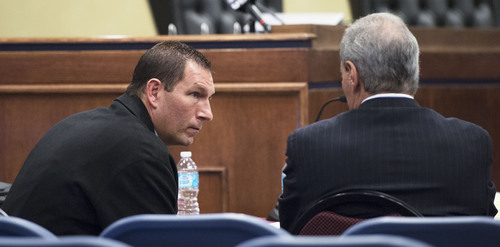This is an archived article that was published on sltrib.com in 2014, and information in the article may be outdated. It is provided only for personal research purposes and may not be reprinted.
West Valley City • If harsh discipline for demoted officer John Coyle involved "sending a message" — as a deputy police chief conveyed during a Civil Service Commission hearing for the former leader of the Neighborhood Narcotics Unit — it was an unfair action that should be overturned, the officer's attorney argued Thursday.
"People are disciplined if they do something wrong," said attorney Erik Strindberg during the appeal hearing for the officer. "That discipline must be proportionate to what they've done wrong and it must be consistent [with other officers' discipline.] The case law does not say one of the factors to be considered is 'sending a message' in deciding what the punishment should be."
Strindberg said during closing arguments Thursday that his client was harshly and unfairly disciplined compared to other officers who were part of the discredited and now-disbanded narcotics unit.
Coyle, who led the unit, was demoted from lieutenant to the rank of officer, which resulted in an annual pay cut of $20,000, Strindberg said.
But people beneath Coyle were given "slaps on the wrist," according to Strindberg, who noted that Coyle's sergeant was disciplined with 80 hours off without pay.
"That's a huge, huge, huge difference," he said. "The discipline was neither proportional or consistent."
But city attorney Martha Stonebrook argued Thursday that Coyle "lost his way" as a leader, and was an incompetent supervisor.
"John Coyle had a powerful position," Stonebrook argued. "But unfortunately, he was not a powerful leader."
During Coyle's two-day appeal hearing, city attorneys worked to paint Coyle as a poor leader, who knowingly let his unit run amok, failed to take responsibility for his actions and had a disregard for the law and police procedures.
On Thursday, Strindberg argued that the city did not present enough evidence to prove the allegations against Coyle: that he allowed cash and property to be taken out of seized vehicles to be use by his unit to purchase drinks and snacks; that he failed to properly supervise the booking of evidence; and failed to supervise the proper use of force.
"I urge this commission to overturn this decision and put him back to work," Strindberg said in closing.
The three-member commission took the case under advisement Thursday morning.
A city-led probe last year into the narcotics unit unearthed a number of problems, including mishandling of evidence, booking evidence without proper documentation and the possibility of missing drugs and money.
The probe also found that items, such as loose change or a CD in a seized vehicle, were improperly accounted for and that officers kept "trophies" from drug busts for themselves and for use as training aids. As a result of the probe, state and federal prosecutors have tossed more than 120 cases linked to the narcotics unit.
Coyle was cleared of most allegations during an initial internal affairs investigation and no serious discipline — particularly not a demotion — was recommended. But a second investigation, lasting 11 days, resulted in discipline that led to his demotion, which came last August, a day after new West Valley City Police Chief Lee Russo was hired, testimony revealed.
Russo said after the closing arguments Thursday that he has not second-guessed the decision to demote Coyle.
"I strongly stand by the decision to demote here," the chief said. "I believe it was the right thing to do."
Russo said Coyle should have been a leader in the unit, even if he was not given proper leadership himself. The chief said he hopes to earn back community trust "one day at a time" — starting with Coyle's hearing.
"Hopefully, the city prevails and we show accountability," Russo said, adding that he hopes to eventually have a restructured narcotics unit back in place at the police department.
City Manager Wayne Pyle testified during the hearing that Coyle was evasive during an internal affairs interview, and it was Pyle's impression that Coyle hadn't taken proper responsibility.
"He seemed to establish a pattern of basically saying, 'I didn't know about it' or 'I wasn't responsible for it' or 'I hadn't read it in policy' … [those] are not indicators of good leadership," Pyle testified.
Strindberg had countered that in the pre-disciplinary hearing, Coyle admitted he had made mistakes, could have done a better job managing his sergeant and accepted responsibility.
But Pyle stuck to his decision to demote Coyle, he said, given the "weight of the documentation" and his impression of Coyle was not taking proper responsibility.
Coyle took the witness stand Tuesday, saying he wanted his side of the story heard.
"I have the ability to be a good supervisor here," Coyle told the commission. "I would want to move forward. That's what I wanted to do, was move forward and learn from this."
Coyle testified that he was not aware the the practice of detectives running each other's evidence to the evidence lockers required documenting the chain of custody. He also insisted he was never told to book into evidence the loose change officers found in vehicles that were going up for auction, and was under the impression that they did not file separate use-of-force reports when officers only displayed a weapon and had not used it.
The city's probe followed the November 2012 shooting death of 21-year-old Danielle Willard by a member of the narcotics unit — a shooting deemed unjustified by Salt Lake County District Attorney Sim Gill.
Strindberg had planned to call other members of the nine-member narcotics unit, but by Tuesday afternoon, seven of the officers had refused to testify, asserting their Fifth Amendment right against incriminating themselves.
Strindberg had complained Monday that the officers' refusal to testify would make it hard to defend Coyle against the allegations leveled by the city.
Twitter: @jm_miller



